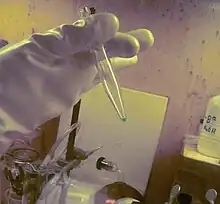 A 22 milligram solution of berkelium(III) nitrate, photographed c. 2009/10 | |
| Names | |
|---|---|
Other names
| |
| Identifiers | |
3D model (JSmol) |
|
| |
| Properties | |
| Bk(NO3)3 | |
| Molar mass | 433.01 g/mol |
| Appearance | Light-green solid[1] |
| Melting point | 450 °C (842 °F; 723 K)[1] decomposes |
| Solubility | Soluble in nitric acid |
| Hazards | |
| Occupational safety and health (OHS/OSH): | |
Main hazards |
Radioactive |
Except where otherwise noted, data are given for materials in their standard state (at 25 °C [77 °F], 100 kPa).
Infobox references | |
Berkelium(III) nitrate is the berkelium salt of nitric acid with the formula Bk(NO3)3. It commonly forms the tetrahydrate, Bk(NO3)3·4H2O, which is a light green solid. If heated to 450 °C, it decomposes to berkelium(IV) oxide and 22 milligrams of the solution of this compound is reported to cost one million dollars.
Production and uses
Berkelium(III) nitrate is produced by the reaction of berkelium metal, the hydroxide,[1] or chloride[2] with nitric acid.[1] This compound has no commercial uses, but was used to synthesize the element tennessine. The aqueous compound was painted onto a titanium foil and was bombarded with calcium-48 atoms to synthesize the element tennessine.[3]
This compound is used as a pathway to pentavalent berkelium compounds by the collision-induced dissociation of this compound to produce BkO2(NO3)2– which contains berkelium in the +5 oxidation state.[2]
References
- 1 2 3 4 Haire, R. G., Proc. Rare Earth Res. Conf., loth, Carefree, Arizona, April-May, p. 882 (1973) doi:10.2172/4549027
- 1 2 Attila Kovács; Phuong D. Dau; Joaquim Marçalo; John K. Gibson (2018). "Pentavalent Curium, Berkelium, and Californium in Nitrate Complexes: Extending Actinide Chemistry and Oxidation States". Inorganic Chemistry. ACS Publications. 57 (15): 9453–9467. doi:10.1021/acs.inorgchem.8b01450. OSTI 1631597. PMID 30040397. S2CID 51717837.
- ↑ J. B. Roberto; K. P. Rykaczewski (2016). "Discovery of element 117: Super-heavy elements and the "island of stability"". Separation Science and Technology. 53 (12): 1813–1819. doi:10.1080/01496395.2017.1290658. OSTI 1408011. S2CID 99111297.